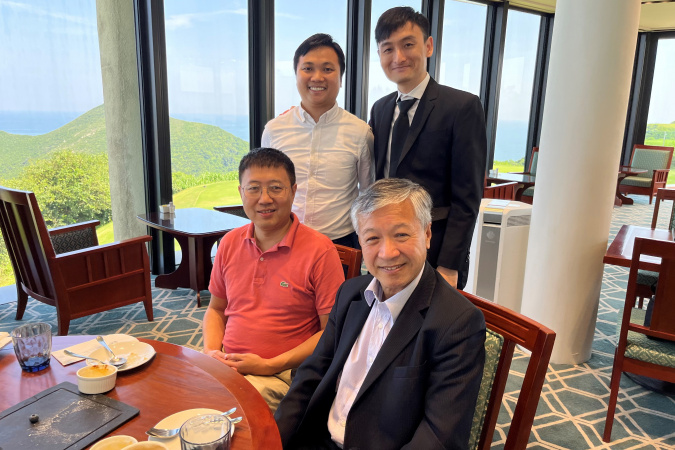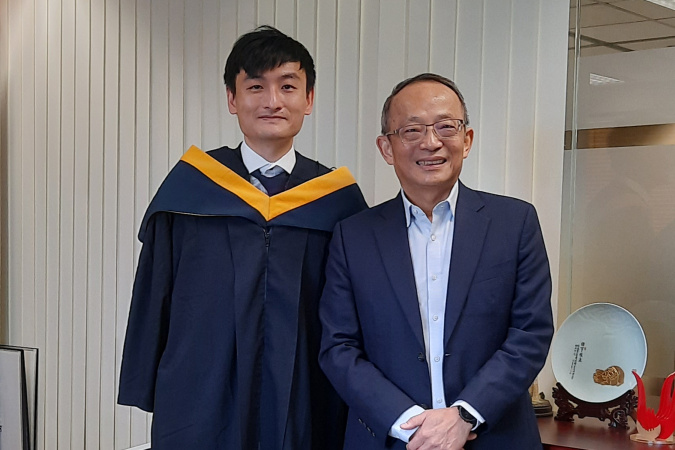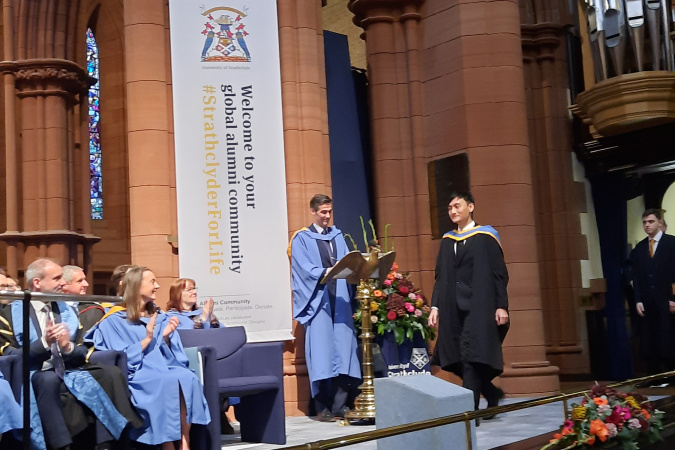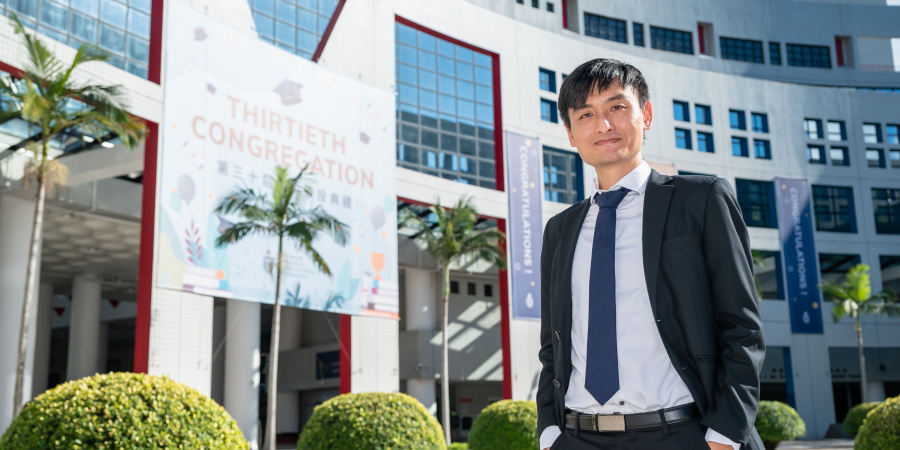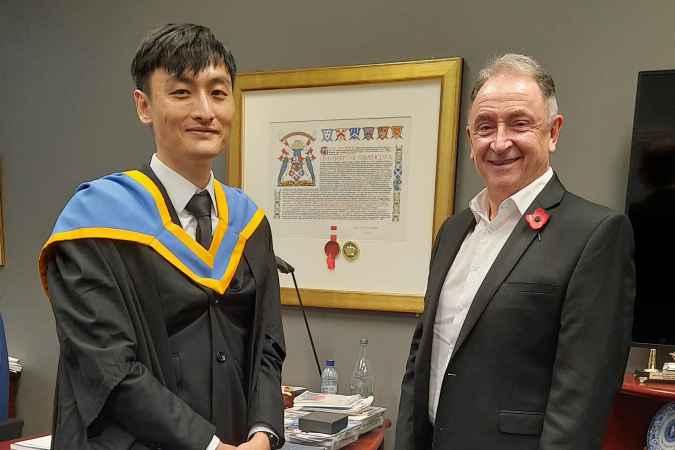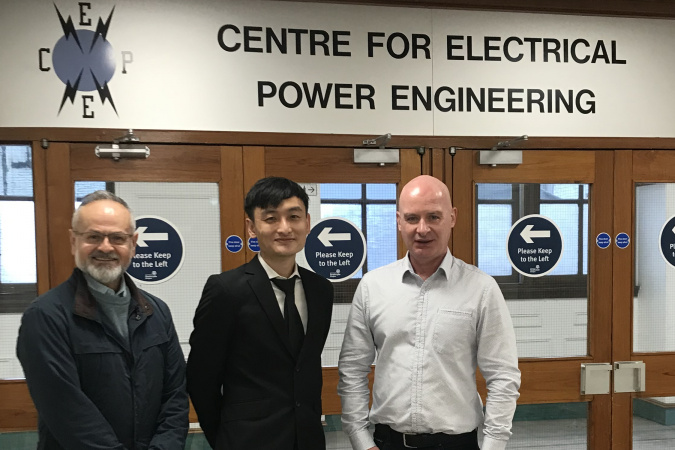First Graduate of Dual Master’s Degree Focusing on Future Energy and Power System Provides Smart Solutions to CLP
Binnie YIU Wai-Keung, the first graduate of the dual master’s degree program focusing on future energy and power system smart operation and management co-offered by the Hong Kong University of Science and Technology (HKUST), University of Strathclyde, and CLP Power Academy, has been pivotal in developing an ensemble model to handle load forecasting and thus citywide power optimization at CLP Power Hong Kong Limited (CLP) where he currently works as an Engineer. With an outstanding Grade Point Average (GPA) at HKUST and reaping the Best MSc Student Award at Strathclyde, Binnie is pleased to be inspired by top scholars and industry experts at the dual degree program with emphases on both theory and practicum.
Completing part-time MPhil within three years while working full-time
Having graduated with a MSc in Mathematics at CUHK and joined CLP as a Procurement Officer in 2018, Binnie’s dream to pursue a research master’s came true when there was a briefing at the company about the dual degree program organized by CLP Power Academy to be commenced in Fall 2019 that would lead to HKUST’s MPhil in Computer Science and Engineering* and the University of Strathclyde’s MSc in Future Energy and Power System Smart Operation and Management.
“It was often difficult to pursue a research master’s program while working full-time. At CLP’s briefing session given by CLP Power Academy’s Vice-Chancellor Ir. Prof. Paul POON, I was excited to learn that this part-time dual degree program would enable me to work and study at the same time to acquire knowledge about the industry, trends in science and engineering, as well as a full picture of CLP’s business,” recalled Binnie who had completed the program in August 2022 as its first graduate.
“Being fond of mathematics, I am honored to be supervised by both Prof. ZHANG Tong, HKUST’s Chair Professor of Mathematics as well as Computer Science and Engineering, and by CLP industry supervisor Dr. LEE Cheuk-Wing for my thesis at this superb university, HKUST. The University of Strathclyde on the other hand, is well-known for its industry expertise in electricity and power. The industry-based program fulfills my dream and enables me to meet with top scholars and industry experts with a variety of domain knowledge. The required thesis, meant to be applied to tackle real-life industry challenges, is most important.”
Turning thesis into CLP application
Before engaging in the first cohort of Hong Kong’s first joint academic and industry-run dual master’s degree focusing on future energy and power system smart operation and management, Binnie had achieved MSc in Mathematics at CUHK, BEng in Mechanical Engineering at PolyU, and had accumulated over six years of work experience in engineering. He continued to broaden knowledge in the hot areas of AI via self-learning and online research prior to applying for the dual master’s degree.
When Binnie first applied for the program, he was already determined to write a thesis about load forecasting for his employer. “In Hong Kong, electricity consumption is mostly related to temperature, as extremely hot days generally lead to heightened use of air conditioning. Citywide use of electricity varies daily. At the power company, we try to do system short-term load forecasting (STLF) from hours to days during daily operation. At 12 noon every day, we try to predict hourly electricity load demand in megawatts starting from 12 o’clock at night for 24 hours so that we may generate the optimal amount of electricity to ensure customer satisfaction.”
Inspired and supervised by HKUST’s Prof. Zhang and CLP’s Dr. Lee, Binnie wrote a thesis that advocated the use of Prof. Zhang’s algorithm Regularized Greedy Forest (RGF), a tree-based machine learning model considering the forest structure to form the decision forest. On top, Binnie also used two gradient boosting models XGBoost and LightGBM to form an ensemble model. “Deploying the three models with different weighted averages, the resultant ensemble model has the benefits of all three with improved stability and accuracy.”
As to practical applications, Binnie, who was then transferred to CLP’s Technical Services Department as an Engineer for condition monitoring, used temperature and heat index from three selected Hong Kong Observatory’s weather stations as input for the model. Together with CLP’s System Operation Department, they managed to develop, test, and implement the ensemble model starting from 2021. By early 2022, they had successfully introduced the model to CLP’s daily operations.
Now up and running, the model produces forecasting results that enable system operators to effectively manage demand responses, optimize generation resources, and simplify and facilitate operational planning decisions. It leads to enhanced equipment servicing decision-making while ensuring sufficient energy supply to customers and ultimately a digitalized and greener utility.
He is thrilled to see his “baby” preparing citywide forecast and creating real-world impact. “Accurate forecasting and optimization mean that we can avoid generating too much or too little energy for users. Also, incentives could be given to some users who do not have strong needs for electricity during citywide peak hours, so as to ensure optimal supply to other users.”
The project, related to sustainable development from the decarbonization aspect, improves the system’s forecasting performance, saves fuel and thereby facilitates decarbonization and enhances operational excellence. With the hope that the forecasting model may have extended use from the system to the circuit and consumer levels in future, it will encourage industrial, commercial, and residential consumers for more intelligent energy use.
A warm welcome at Strathclyde
Thanks to the dual degree program, Binnie had taken HKUST’s courses and seminars that covered AI and machine learning, data mining and database, advanced numerical methods, statistical machine learning, optimization and others on the University’s scenic campus. Staying in Hong Kong, he also attended online courses offered by the University of Strathclyde in renewable energy; power system fundamentals, operation, control, protection, and management; etc. via purely distance learning.
His hard work paid off. Awarded distinction in his Strathclyde MSc degree and selected as one of the two recipients of Best MSc Student Award in the field of energy and power engineering at Strathclyde, Binnie had the opportunity to individually meet with the Vice-Chancellor, Executive Dean, and other senior faculty members at the university in Glasgow, UK. He was also invited by professors to a site visit of the laboratories and a wind farm.
“It was a valuable experience to see how their stunning wind turbines work, and to have an in-depth tour in the Scottish university with strong expertise in electricity and power.” He added, “When I first went to Glasgow as a tourist in 2010, I would not have imagined that I am now graduating from the university there in front of my family members from Hong Kong. At the same time, I would also like to thank the companions who have been walking along with me for years. It would not be a complete journey without their companionship. It was quite an emotional journey indeed!”
Comparing the dual master’s with other programs he had engaged in, Binnie believes it stands out as Hong Kong’s first joint academic and industry-run dual master’s focusing on future energy and power system smart operation and management with classroom-based and online learning, and an aim to tackle practical real-world challenges.
Find one’s passion and go for it
Having completed HKUST’s MPhil and Strathclyde’s MSc in less than three years while working full-time, Binnie balanced studies and work by setting priorities and scheduling sports activities in between to release stress. With the motto “never stop bettering oneself”, he believes in staying humble and constantly seeking improvements to strive for the best. Considering his engineer father as his role model, Binnie finds the greatest satisfaction in creating things that work well.
Looking back, he was glad that he overcame the challenge of feeling confused during early career. As a fresh graduate of mechanical engineering back in 2010, he worked for six years as an acoustic consultant but was not able to envision his future path then. Going through soul searching and rediscovering his talent and passion in mathematics, he went back to university for postgraduate studies in mathematics while auditing undergraduate courses. As he re-entered the workforce and joined CLP in 2018, he continued to steer his career path step by step to arrive at where he is now. “When feeling lost, one should try to rediscover what one does best and enjoys best and then go for it.”
Looking toward the future, he will focus on both career and academics with the possibility of pursuing further studies and research on machine learning. To practicing engineers with dreams of academics and research, he advises that they engage in programs with foci on both practical and theoretical aspects. “It is not about studying just for the sake of studying. I have a strong determination to dedicate to the industry and hope to leave my little footprint on it. Combining practicum and theory, we can really make real-life impact to the industry,” said the young engineer and scholar with remarkable achievements.
* Graduates will be awarded a HKUST MPhil degree in one of these disciplines depending on their academic paths and thesis projects: Chemical and Biomolecular Engineering, Civil Engineering, Computer Science and Engineering, Electronic and Computer Engineering, or Mechanical Engineering.
